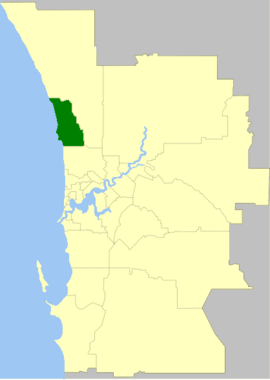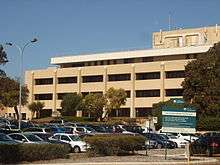City of Joondalup
| City of Joondalup Western Australia | |||||||||||||
|---|---|---|---|---|---|---|---|---|---|---|---|---|---|
 Location of Joondalup in the Perth metropolitan area | |||||||||||||
| Population | 167,891 (2015 est)[1] | ||||||||||||
| • Density | 1,697.6/km2 (4,396.7/sq mi) | ||||||||||||
| Established | 1998 | ||||||||||||
| Area | 98.9 km2 (38.2 sq mi) | ||||||||||||
| Mayor | Troy Pickard | ||||||||||||
| Council seat | Joondalup | ||||||||||||
| Region | North metropolitan Perth | ||||||||||||
| State electorate(s) | Carine, Hillarys, Joondalup, Kingsley, Ocean Reef | ||||||||||||
| Federal Division(s) | Moore | ||||||||||||
 | |||||||||||||
| Website | City of Joondalup | ||||||||||||
| |||||||||||||
The City of Joondalup is a local government area with City status in Perth, Western Australia. It covers the metropolitan Perth city of Joondalup in its entirety, as well as the town centres of Hillarys and Warwick.
The City covers an area of 98.9 square kilometres (38.2 sq mi) from Kinross in the north, to Warwick in the south, with a population of about 150,000 at the 2006 census. At the 2001 census, 18% of the population were born in the United Kingdom, while the area was also home to significant Italian, Polish, Chinese and Malaysian minorities.
Geography
The City is bounded by Beach Road to the south, Wanneroo Road and Lake Joondalup to the east, Tamala Park to the north and the Indian Ocean to the west.
History
Prior to the 1970s, the region now known as the City of Joondalup was sparsely populated. During the 1980s and 1990s, massive growth occurred, partly due to State Government policies which made Joondalup a regional centre, including the extension of the Mitchell Freeway and the construction of the Joondalup railway line.
Until 1998, the area had been controlled by the City of Wanneroo and its predecessors. An independent commission suggested the creation of Joondalup out of the coastal areas of Wanneroo, and the City of Joondalup came into existence on 1 July 1998.
Mayors
- 1998-2003 John Bombak
- 2003 Don Carlos
- 2003-2006 (suspended)
- 2006–present Troy pickard
2003-2004 Council controversy
Joondalup City's elected Council (including the Mayor) was suspended by Tom Stephens, the Minister for Local Government, on 5 December 2003 after receiving complaints indicating that the Council had become dysfunctional. The Council was replaced by five Commissioners; Chairman John Paterson (former Mayor of Nedlands), Peter Clough, Michael Anderson, Anne Fox and Steve Smith. The Council's power was temporarily transferred to the Commissioners, for a period envisioned to last until the Local Government elections in May 2005 (as it turned out, the next elections were in fact held in May 2006, under Section 4.14 of the Local Government Act 1995 ).
A subsequent inquiry, referred to as the McIntyre Inquiry after its Chairman Greg McIntyre, revealed in October 2005 that the Council had effectively split into two opposing groups over a controversy surrounding the qualifications of the city's Chief Executive Officer (CEO). The CEO in question, Denis Smith, was accused of misrepresenting his educational qualifications by Deputy Mayor Don Carlos. Don Carlos demanded Denis Smith's immediate dismissal, but his motion was unsuccessful. The councillors opposed to Denis Smith's dismissal expressed the view that the CEO should not be dismissed as his performance was satisfactory. Instead, the council passed a motion forbidding Don Carlos from publicly criticising Denis Smith.
Don Carlos subsequently became Mayor of Joondalup at the next election.
Wards and suburbs

The suburbs of the City of Joondalup are grouped into six wards, each represented by two councillors:
| Ward | Suburbs, villages and districts |
|---|---|
| North Ward | Burns Beach, Connolly, Currambine, Iluka, Joondalup City Centre, Kinross |
| North Central Ward | Edgewater, Heathridge, Mullaloo, Ocean Reef |
| Central Ward | Beldon, Craigie, Kallaroo, Woodvale* |
| South West Ward | Hillarys, Padbury, Sorrento |
| South Ward | Duncraig, Marmion, Warwick |
| South East Ward | Greenwood, Kingsley |
* Part of Woodvale is located within the City of Wanneroo.
Population
| Year | Population |
|---|---|
| 1991 | 122,152 |
| 1996 | 140,193 |
| 2001 | 147,126 |
| 2006 | 149,673 |
| 2011 | 152,406 |
Sister cities
References
- ↑ "3218.0 – Regional Population Growth, Australia, 2014–15". Australian Bureau of Statistics. Retrieved 29 September 2016.
External links
Coordinates: 31°44′42″S 115°45′58″E / 31.745°S 115.766°E